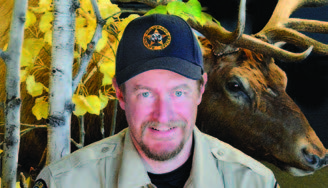
Editor’s Note: This is a regular monthly column from Colorado Parks and Wildlife about wildlife issues in the Falcon area by a career wildlife officer.
Aaron Berscheid is a district wildlife officer for Colorado Parks and Wildlife. Aaron covers the “wild” side of Northeast El Paso County, including Black Forest, Falcon, Peyton and Calhan. He also covers some of Elbert County, north of U.S. Highway 24 and south of State Highway 86, including the towns of Elbert, Kiowa, Ramah, Simla, Matheson and a small portion of the Limon area.
Babies are coming! Please leave them alone!
By Aaron Berscheid
District Wildlife Manager, CPW
It is getting to be that time of year — baby animals are on the way. We are all accustomed to seeing wildlife around the Black Forest, Falcon and Peyton areas and soon we will start seeing their cute little offspring. While these little critters can tug at your heartstrings, there are a few things we should chat about before you act on an impulse to ‘help’ when you see one by itself.
We, as humans, are super compassionate and caring, as we should be. But this often leads to misguided decisions when it comes to our little furry and feathered friends. Human babies are completely helpless and human parents are wired to be involved in every aspect of a newborn’s life. Baby humans do not fend for themselves and are not self-reliant at all until they begin to toddle at around a year old.
Wildlife is much different and rarely need our human-type of smothering care.
A deer baby, or fawn, can walk within minutes of being born. It can see, focus, hear and follow mom within an hour of birth.
The mother deer will clean the fawn off and move it to a safe location where it will leave the baby alone for hours and even days. This may seem harsh by human standards, but really it is the safest thing the mother can do.
The mother deer has a scent that predators can trail and find, but the fawn does not. Predators often will literally just walk by fawns. The mother will stash the fawn in tall grass and leave it alone up to 72 hours to go eat and get the nutrients she needs to be able to feed the fawn.
Usually when humans find fawns, they are laying in their yard motionless with their head on the ground. The mother left it there because it felt safe to do so.
THEY ARE NOT ABANDONED!
Forgive me for shouting, but this is an important message that wildlife managers get passionate about. Fawns do not need our help. As soon as you touch that fawn, its chances of survival decrease drastically. And if you remove it from that location, that fawn is now in a critical condition. You are not rescuing that fawn. Odds are you just orphaned that fawn.
No human food or milk or milk substitute is adequate nutrition for that fawn. The fawn’s mother is the sole source of survival; and, if you remove it from where its mother left it, well there is a limited chance that the mother and baby will be reunited; even if the fawn is returned to the same place later.
Colorado Parks and Wildlife works closely with licensed rehabbers and they are the only ones legally allowed to possess or handle wildlife, including fawns. There is limited space and resources they have available to take care of the (unfortunately) numerous deer fawns that are mistakenly picked up and “rescued” unnecessarily.
Once the rehabbers are full, that’s it. There is a finite amount of space.
So, please, please, please, PLEASE do not make me have to make a tough decision on an outcome that nobody wants in a completely avoidable situation.
Leave any baby animals alone.
If you are concerned that an animal is abandoned or needs help, please call our office at 719-227-5200 and report the situation WITHOUT touching or disturbing the animal. A wildlife officer will respond if necessary and assess the situation. The worst thing you can do for creatures in nature is to interfere with a natural process.
In the coming months, I’ll share more stories as I write about wildlife issues in our community. Got a question, problem or column idea? Please email me at aaron.berscheid@state.co.us or call me at 719-227-5231.
I might even answer your question in a future installment of “Wildlife Matters.”



